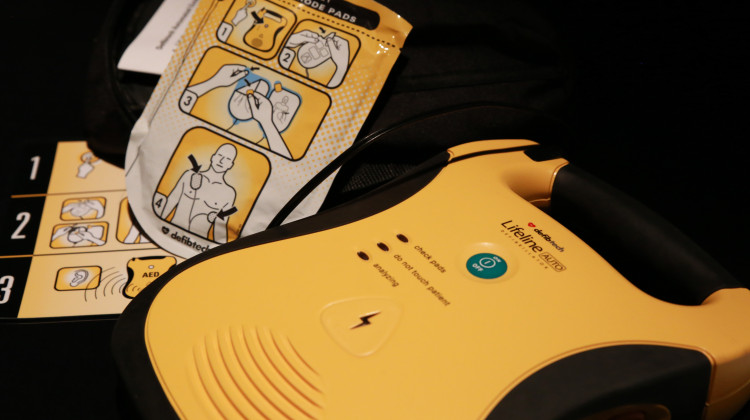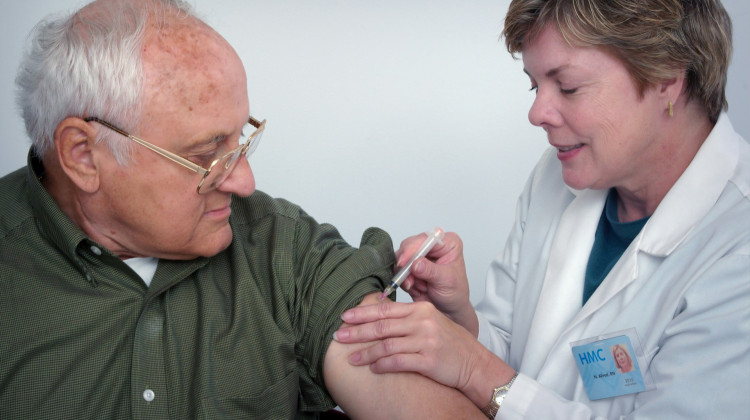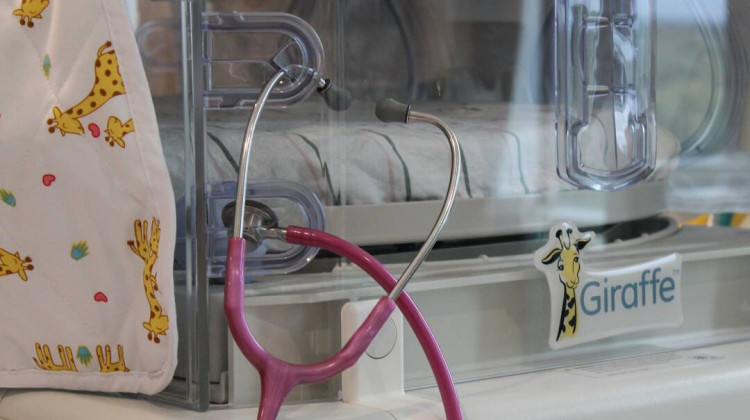
An automated external defibrillator, or AED, is a medical device that delivers an electrical shock if a heart has stopped beating.
Elizabeth Gabriel / Side Effects Public MediaNearly 90% of kids who go into cardiac arrest outside of a hospital die. But many Indiana schools aren’t equipped to respond if it happens. But a bill introduced this legislative session would require schools to be prepared if someone’s heart stops.
A sudden cardiac arrest is when a person is no longer conscious or breathing because their heart stopped pumping blood. It can happen if a person has a heart condition and can take place when someone is sitting in a classroom, walking or even while sleeping at home.
More than 20,000 children have a cardiac arrest annually in the United States. Research shows that sudden cardiac arrest survival rates can be as high as 85% for students, 61% for adults and 89% for youth athletes if schools are prepared with automated external defibrillators, or AEDs, and a response plan.
A recent analysis by Side Effects Public Media found that nearly 40% of Indiana’s Black students went to a school with only one AED, or none at all. That’s compared to almost 33% of Hispanic students, about 30% of Asian students and 29% of White students.
This is the third year Indiana Republican senator Linda Rodgers has tried to pass legislation to require AEDs in schools. In 2023, SB 369 aimed to mandate AEDs in schools, but the bill was significantly weakened by the time it became law. Now it only suggests that schools have these devices.
Rodgers hopes this time the requirement sticks.
“A couple [of] young men up in my area passed away,” Rogers said. “One because the AED was in the coach's office, and another, there was an AED just down the hall, and no one knew it was there. So having the plan — having the AEDs — is going to save lives.”
Senate Bill 350 would require county health departments to work with schools to establish an emergency action plan if someone goes into sudden cardiac arrest. It also requires schools to follow recommendations from the American Heart Association, which suggests having AEDs on site. County health departments would have the option of funding these devices or schools can apply for money through the Indiana Department of Education, according to the bill.
The proposed legislation would also require IDOE to produce a survey that describes the preparedness levels of each school and mandate that all facilities respond to the survey by July 31, 2025.
A current law that was passed in 2023 requires IDOE to produce the survey, but many schools were able to skirt around the law because the legislation doesn’t require all schools to participate. Still, the current bill does not propose a penalty if schools don’t participate in the survey.
“Hopefully we have schools that will follow it this time,” Rogers said. “Especially because this is something that saves lives, and certainly they don't want to be a school where something terrible happens and they weren't prepared.”
Data from the 2023 survey shows that only 54% of Indiana’s public, charter and private schools responded to the state survey. Of those schools, Side Effects Public Media found that 41% of schools with a maximum grade level of 12th grade had less than four AEDs. For public schools, nearly 40% had less than four AEDs.
Some medical professionals suggest that big campuses, like high schools, should have four or more AEDs.
The bill was referred to the Committee on Health and Providers Services on Jan. 13.
Contact WFYI’s health reporter Elizabeth Gabriel at egabriel@wfyi.org
Side Effects Public Media is a health reporting collaboration based at WFYI in Indianapolis. We partner with NPR stations across the Midwest and surrounding areas — including KBIA and KCUR in Missouri, Iowa Public Radio, Ideastream in Ohio and WFPL in Kentucky.
 DONATE
DONATE







 Support WFYI. We can't do it without you.
Support WFYI. We can't do it without you.